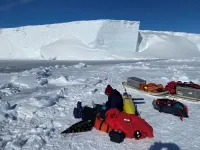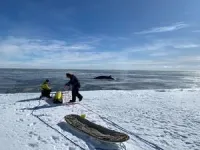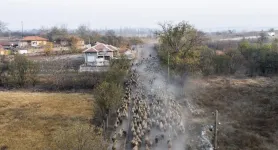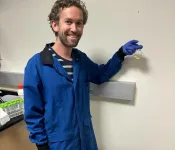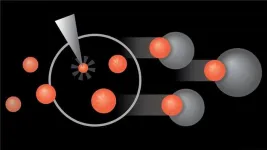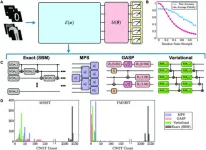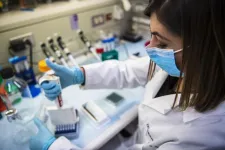(Press-News.org) New research reveals for the first time how a major Antarctic ice shelf has been subjected to increased melting by warming ocean waters over the last four decades.
Scientists from the University of East Anglia (UEA) say the study - the result of their autonomous Seaglider getting accidentally stuck underneath the Ross Ice Shelf - suggests this will likely only increase further as climate change drives continued ocean warming.
The glider, named Marlin, was deployed in December 2022 into the Ross Sea from the edge of the sea ice. Carrying a range of sensors to collect data on ocean processes that are important for climate, it was programmed to travel northward into open water.
However, Marlin was caught in a southward-flowing current and pulled into the ice shelf cavity where it remained, with its sensors on, for four days before re-emerging. During this time the ‘lost’ glider completed 79 dives, taking measurements of the water within the cavity to a depth of 200 metres, right up to base of the overlying ice shelf.
Researchers from UEA’s School of Environmental Sciences recorded a 50 metre-thick ‘intrusion’ of - relatively - warm water that had entered the cavity from the nearby open water. Water temperatures ranged from -1.9°C to a warmer -1.7°C under the ice.
Subsequent re-analysis of all available measurements shows that heat transported into cavity has increased over the last 45 years, most likely due to warming of the Ross Sea because of climate change. The findings are published in the journal Science Advances.
“While the temperature increase - four thousandths of a degree a year - might not seem all that much, it could lead to around 20 to 80 cm of additional ice loss per year over the 45 years we look at,” explained lead author Dr Peter Sheehan.
“We found the waters of the intrusion were warm enough to melt the underside of the ice shelf, unlike the freezing-point waters they likely displaced. What's new here is that we can track the warm water pretty much from the open water of the Ross Sea at the ice front, back into the cavity. We have not seen one of these intrusions happening directly before.”
Dr Sheehan added: “A trip into the cavity underneath the Ross Ice Shelf was not planned, and it’s not normally possible to measure this region of an ice shelf: you can’t send instruments this close to the underside of an ice shelf deliberately, it’s too risky.”
The ice shelves that surround Antarctica are exposed to the warmth of the ocean across the expanse of their undersides that float out over the continent’s shelf seas, and the ocean-driven melting that occurs at the ice base is the largest cause of Antarctic ice-mass loss.
While the melting of floating ice does not itself substantially raise sea level, ice shelves slow the seaward flow of land ice and so stabilize the Antarctic ice sheet; their thinning and disintegration would hasten the delivery of land ice to the ocean and accelerate global sea-level rise.
One of the processes that can drive warm surface water under the Ross Ice Shelf is wind. Certain wind patterns lead to southward flow in the surface ocean and into the ice shelf cavity.
These wind-driven ocean-surface flows are called Ekman currents, and as with any ocean current, these have an associated heat transport. Because this is an ocean-surface process, this heat is instantly available to melt the overlying ice: it doesn’t have to wait to be mixed upward to the ice base.
Ekman heat transport is particularly relevant for climate scientists because oceans absorb and redistribute much of the Earth’s heat. Changes in this system can have profound effects on weather, sea levels, and global temperature trends.
Dr Sheehan and co-author Prof Karen Heywood used long-term measurements of wind and ocean temperature - blended with a model to fill in spatial and temporal gaps in the record - to calculate the strength of southward Ekman heat transport over the last 45 years. They found that the heat transported into the cavity by Ekman currents has increased.
Year-to-year variability is driven by the wind. However, the trend towards greater heat transport into the cavity is likely linked to warming of the Ross Sea - because the water has warmed, winds today will transport more heat energy into the cavity than winds of comparable strength in the past.
Prof Heywood said: “It appears reasonable to expect that the magnitude of the Ekman heat flux, and of the melting that it drives, will increase yet further as climate change drives continued ocean warming. This trend is a concern in itself.
“The influence of surface-water intrusions, alongside the trends and variability in the Ekman dynamics that can drive these, must be incorporated into climate models, not least given continued uncertainty in the response of Antarctic land-based ice to climate change.”
This is the first time that this process has been looked at using a long-term, multi-decadal data set. Previous understanding of surface-water intrusions has come mainly from comparisons of hydrography in open water, for example from ships, observations from tagged seals, and ice moorings deployed within a cavity.
The study was funded by the UK Natural Environment Research Council, the US National Science Foundation and European Research Council Horizon 2020 programme.
‘Ross Ice Shelf frontal zone subjected to increasing melting by ocean-surface waters’ Peter Sheehan and Karen Heywood, is published in Science Advances on November 8.
END
Measurements from ‘lost’ Seaglider offer new insights into Antarctic ice melting
2024-11-08
ELSE PRESS RELEASES FROM THIS DATE:
Grant to support new research to address alcohol-related partner violence among sexual minorities
2024-11-08
Navigating the intersection of alcohol use and intimate partner violence amongst young couples is not an easy journey, and for bisexual+ couples, the road may be even more winding.
“No study has examined the extent to which alcohol use increases intimate personal violence among bisexual+ young adults or daily experiences unique to them. Our study will look at factors such as minority stressors that may lead to alcohol-related partner violence,” said Meagan Brem, director of the Research for Alcohol and Couple’s Health Lab at Virginia Tech.
Alcohol use and intimate partner violence - defined as any action in a ...
Biodiversity change amidst disappearing human traditions
2024-11-08
A Branco Weiss Fellowship – Society in Science has been awarded to Dr Gergana Daskalova. The fellowship funds Daskalova’s research project “Biodiversity change amidst disappearing human traditions and changing socio-economics”. She joins the Department of Conservation Biology at the University of Göttingen to work together with Professor Johannes Kamp. The five-year fellowship, which is worth over €530,000, will enable Daskalova to investigate the ecological and human fingerprints of land abandonment. Considering the question from both a local and a global perspective, Daskalova’s research will reveal what happens to nature when people leave, ...
New approaches to synthesize compounds for pharmaceutical research
2024-11-08
Junior Professor Johannes Walker, University of Göttingen, has been awarded an Exploration Grant from the Boehringer Ingelheim Foundation. Walker teaches and carries out research at the Institute for Organic and Biomolecular Chemistry. The award of 180,000 euros will enable Walker and his team to develop new approaches to synthesizing new compounds.
“The aim of our project is to develop new strategies for the synthesis of a particular group of new chemical compounds,’ Walker explains. These compounds are called saturated polycyclic molecules. They are structurally complex ...
Cohesion through resilient democratic communities
2024-11-08
A new EU joint research project led by the University of Göttingen will explore how migration, demographic change and current crises are affecting social cohesion and democratic structures in Europe. A key objective is to find out how resilient democratic structures can strengthen local communities in times of profound demographic change. The project “Identities - Migration - Democracy (We-ID)” has been awarded funding of around three million euros over three years by the European Union.
European societies are undergoing a profound demographic transformation: falling birth rates, rising life expectancy and migration are increasingly ...
UC Santa Cruz chemists discover new process to make biodiesel production easier, less energy intensive
2024-11-08
UC Santa Cruz chemists have discovered a new way to produce biodiesel from waste oil that both simplifies the process and requires relatively mild heat. This discovery has the potential to make the alternative fuel source much more appealing to the massive industrial sectors that are the backbone of the nation’s economy.
In 2022, the U.S. transportation sector alone used about 3 million barrels of diesel per day, accounting for about 75% of total consumption of the fuel in this country. That same year, ...
MD Anderson launches Institute for Cell Therapy Discovery & Innovation to deliver transformational new therapies
2024-11-08
HOUSTON ― The University of Texas MD Anderson Cancer Center today announced the launch of its Institute for Cell Therapy Discovery & Innovation, which will build upon longstanding MD Anderson clinical and research expertise to lead the world in developing and advancing impactful cell therapies for patients in need.
The institute will bring together top scientists and clinicians to lead exceptional discovery, translational and clinical research that will deliver new insights in immunology and cell engineering, fueling the creation of transformational new treatments that can be rapidly adapted to address emerging needs in cancer, autoimmune diseases, infections ...
New quantum encoding methods slash circuit complexity in machine learning
2024-11-08
A recent study by researchers from CSIRO and the University of Melbourne has made progress in quantum machine learning, a field aimed at achieving quantum advantage to outperform classical machine learning. Their work demonstrates that quantum circuits for data encoding in quantum machine learning can be greatly simplified without compromising accuracy or robustness. This research was published Sept.12 in Intelligent Computing, a Science Partner Journal.
The team’s results, validated through both simulations and experiments on IBM quantum devices, show that their innovative encoding methods reduced circuit ...
New research promises an unprecedented look at how psychosocial stress affects military service members’ heart health
2024-11-08
A University of Massachusetts Amherst researcher will examine the role of cumulative psychosocial stress – as well as race, ethnicity and gender – among U.S. military personnel to gauge their impact on cardiovascular health and healthcare utilization.
The study is funded with a $1 million grant from the Defense Health Agency, part of the Department of Defense (DoD). The findings will help the military develop programs for health promotion and health readiness for active duty and Reserve/National ...
Faster measurement of response to antibiotic treatment in sepsis patients using Dimeric HNL
2024-11-08
The biomarker human neutrophil lipocalin HNL, which was previously shown to be a useful indicator of bacterial infections, may also in the form of Dimeric HNL be used to effectively monitor the success of antibiotic treatment in sepsis. The first promising results in this regard were published in 2019 and now the research group has confirmed these results in a larger study. The study is published in the journal PLOS ONE.
Sepsis, the costliest disease to health care, is a life-threatening condition with high mortality if not diagnosed and ...
Cleveland Clinic announces updated findings in preventive breast cancer vaccine study
2024-11-08
November 8, 2024, CLEVELAND: Cleveland Clinic researchers are presenting updated findings from their novel study of a vaccine aimed at preventing triple-negative breast cancer, the most aggressive and lethal form of the disease.
The study team found that the investigational vaccine was generally well tolerated and produced an immune response in most patients. The team described the side effects of the vaccine, showed the highest tolerated dose to date, and presented the immunologic effects of the vaccine. Findings are being presented at the Society for Immunotherapy of Cancer Annual Meeting.
Launched in 2021 and funded by the U.S. Department of Defense, the ongoing ...
